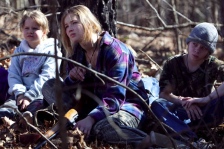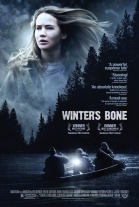Winter's Bone
|  Winter’s Bone is set in the Ozark Mountains of southwestern Missouri, and to American viewers not familiar with the region, it could very well be another country. With the exception of the Deep South, this particular part of the Midwest is a kind of dark mirror of the American imagination, its insular mysteries and perceived lack of progress heightened in recent years by a continual stream of news about the prevalence of backwoods methamphetamine labs and escalating drug addiction. Although beautiful and lush during the spring and summer, winter turns the terrain into a harsh landscape of bitter cold and skeletal trees, which makes the widespread poverty endured by many of the hardscrabble souls that call it home that much more bleak (with the foliage receded, the junk-strew yards and ramshackle buildings are all the more exposed). Yet, the film’s small miracle is that it manages to transcend that despondency, finding in its story a seed of possibility that sometimes good prevails even in the most trenchantly brutal of environments. And, while the film constantly skirts the dangers of turning its story into a banjo-clanging Midwest freakshow of meth heads, squirrel stew, and bad skin, director Debra Granik, whose 2004 debut Down to the Bone was also about drug addiction, leavens its worst moments with a sense of compassion and tenderness that reminds us to understand and empathize with, rather than judge, the characters. Winter’s Bone is set in the Ozark Mountains of southwestern Missouri, and to American viewers not familiar with the region, it could very well be another country. With the exception of the Deep South, this particular part of the Midwest is a kind of dark mirror of the American imagination, its insular mysteries and perceived lack of progress heightened in recent years by a continual stream of news about the prevalence of backwoods methamphetamine labs and escalating drug addiction. Although beautiful and lush during the spring and summer, winter turns the terrain into a harsh landscape of bitter cold and skeletal trees, which makes the widespread poverty endured by many of the hardscrabble souls that call it home that much more bleak (with the foliage receded, the junk-strew yards and ramshackle buildings are all the more exposed). Yet, the film’s small miracle is that it manages to transcend that despondency, finding in its story a seed of possibility that sometimes good prevails even in the most trenchantly brutal of environments. And, while the film constantly skirts the dangers of turning its story into a banjo-clanging Midwest freakshow of meth heads, squirrel stew, and bad skin, director Debra Granik, whose 2004 debut Down to the Bone was also about drug addiction, leavens its worst moments with a sense of compassion and tenderness that reminds us to understand and empathize with, rather than judge, the characters.The story’s heroine is 17-year-old Ree Dolly, who is powerfully embodied in a career-making performance by Jennifer Lawrence. Unlike so many girls her age who have the luxury of worrying about makeup, cell phones, and where they’re going to college, Ree spends her time caring for her younger siblings (a 12-year-old boy and 7-year-old girl) because her mother is an emotional/psychological wreck incapable of taking care of herself, much less others, and her father is a meth cooker who has already served one stint in prison and is facing another. Forced into the role of mother and provider, Ree is barely able to keep things afloat, and she often must rely on the goodwill of her neighbor (Shelley Waggener), who brings by food from time to time and agrees to take on their starving horse. The only thing the family has is their ramshackle house and a few acres of land, both of which Ree discovers her father Jessup has put up as collateral for a bail bond that he is in danger of skipping. Thus, it becomes Ree’s responsibility to track him down and ensure that he shows up for his court date, lest she and her family lose what little they still have. Using that basic plot, taken from a novel by Daniel Woodrell, Granik and coscreenwriter Anne Rosellini immerse us in the film’s ragged environment, following Ree as she trudges across the unrelenting landscape visiting various family members and acquaintances in the hope of turning up her delinquent father. The problem is that Jessup was involved in bad business and may very well have rubbed the wrong people the wrong way, and the deeper Ree goes in trying to find him, the more likely it becomes that she is not looking for him, but rather for his corpse. The people who might know where he is have the most to lose by exposing his whereabouts, and she encounters little but hostility, aggression, and indifference in a male-dominated power structure that is almost like medieval feudalism. We wince at each of her encounters because each poses a unique hair-trigger peril, and when the threatened violence eventually turns physical, it has a kind of fatalistic quality to it that Granik grounds in harsh reality (that is, there is actual attention paid to the pain, bruising, and swelling that goes with a beating, and Ree wears the marks of it for the rest of the film). We fear for her because she’s vulnerable (a 17-year-old girl in a culture dominated by men with guns and women who either cower or emulate their men’s violence), but we respect her because she’s smart, she’s tough, and she puts herself on the line even though she did nothing to deserve it. There are some unexpected turns, such as when her uncle, a shady character named Teardrop (John Hawkes) who is the first of many to answer her probing with bared teeth and threats of violence, turns out to be a more complicated individual whose grizzled exterior hides a fleeting bit of compassion and decency that probably won’t be enough to save his soul, but possibly hers. Similarly, while Ree is clearly the film’s moral center--her steadfast dedication to her family and associated obligations has a quiet nobility that puts most of us to shame--she is not a one-note teenage martyr. Instead, she shows flashes of anger and impatience, and we sense her still-evolving maturity beneath her most brazen acts of courage, which are really just naïve and desperate attempts when all else has failed. Jennifer Lawrence disappears into Ree’s secondhand parkas and knit hats, and she makes us feel not just the chill in the air and the dirt under her fingernails, but the increasingly frantic nature of her endeavor, which eventually winds its way to a grisly climax that has a certain logic, but still feels a bit too grand guignol for the material. Nevertheless, Winter’s Bone is a powerful evocation of both individual and cultural desperation, and while its ending is anything but conventionally “happy,” it provides just enough hope for a brighter future to justify the film’s otherwise brutal depictions of despondent lives. Copyright ©2010 James Kendrick Thoughts? E-mail James Kendrick All images copyright © Roadside Attractions |
Overall Rating: 


 (3.5)
(3.5)


